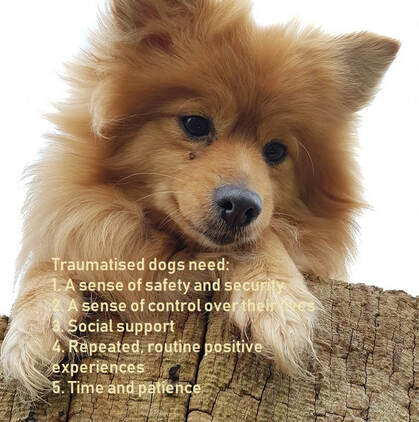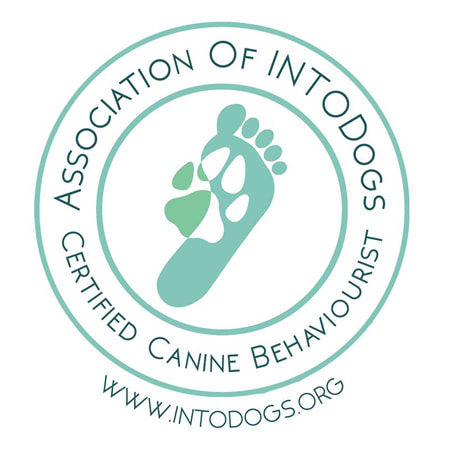Resilience in our rescue dogs

I had a lovely chat last night with a lady who had not long ago adopted a rescue dog from Romania. “I can’t believe she’s settled in as much as she has already!” she spoke. It’s quite remarkable, to be honest, what this dog had gone through in her life, yet how quickly she has bounced back. To be able to adapt to the upheaval of her last few weeks, and by all accounts absolutely love people, dogs and not be phased at all by other stimuli eg cars or noises – that takes quite a lot of resilience in a dog.
What is resilience in a dog? Resilience is the “ability to cope with aversive events” (McConnell, 2015). It’s the ability to be able to bend with the stormy winds of the world, not break.
One of my rescue dogs at home isn’t very resilient unfortunately. She received significant and chronic trauma under the age of 1 and it has affected her significantly since, likely always will. To drop another term into this – she also has a negative bias – if there is something or someone unknown she will automatically react in fear and distrust. Without a moments hesitation her stress/fear behaviours will be clear for everyone to see. Both of these qualities make it harder for life-changing behaviour modification to happen. She’s simply not built to be able to cope with things in the way other dogs can.
Resilience up to a point is developed through genetics. Genetics – that thing you can’t change once the dog is in front of you! Early life experiences does of course play a significant part also. Breeders need to be taking responsibility for this and researching how to build up resilience in very young pups.
More importantly for us, how can we go about building resilience in our troubled dogs who live at home with us now?
McConnell says we need to provide them with a number of things:
A sense of safety and security
A sense of control over their lives
Social support
Repeated positive experiences
Time and patience
These are all things that are in our power to provide for our dogs. Notice how in that list isn’t “make the dog face his/her fears?” or “force her to stay where s/he is anxious until s/he calms down?”. Flooding does not make a resilient dog. There are no repeated positive experiences in flooding!
Importantly though, I don’t think we can take resilience or a positive bias for granted. Yes this lovely rescue dog from yesterday is quite happy greeting everyone at the moment as if they are her best friend! But does that mean we can just throw her into potentially intense situations and assume she will therefore cope? No. It is still a case of taking things slowly and gently which is exactly what her new family are going to do with her. Resilience can be damaged after all, and it is too precious a quality to lose.
What is resilience in a dog? Resilience is the “ability to cope with aversive events” (McConnell, 2015). It’s the ability to be able to bend with the stormy winds of the world, not break.
One of my rescue dogs at home isn’t very resilient unfortunately. She received significant and chronic trauma under the age of 1 and it has affected her significantly since, likely always will. To drop another term into this – she also has a negative bias – if there is something or someone unknown she will automatically react in fear and distrust. Without a moments hesitation her stress/fear behaviours will be clear for everyone to see. Both of these qualities make it harder for life-changing behaviour modification to happen. She’s simply not built to be able to cope with things in the way other dogs can.
Resilience up to a point is developed through genetics. Genetics – that thing you can’t change once the dog is in front of you! Early life experiences does of course play a significant part also. Breeders need to be taking responsibility for this and researching how to build up resilience in very young pups.
More importantly for us, how can we go about building resilience in our troubled dogs who live at home with us now?
McConnell says we need to provide them with a number of things:
A sense of safety and security
A sense of control over their lives
Social support
Repeated positive experiences
Time and patience
These are all things that are in our power to provide for our dogs. Notice how in that list isn’t “make the dog face his/her fears?” or “force her to stay where s/he is anxious until s/he calms down?”. Flooding does not make a resilient dog. There are no repeated positive experiences in flooding!
Importantly though, I don’t think we can take resilience or a positive bias for granted. Yes this lovely rescue dog from yesterday is quite happy greeting everyone at the moment as if they are her best friend! But does that mean we can just throw her into potentially intense situations and assume she will therefore cope? No. It is still a case of taking things slowly and gently which is exactly what her new family are going to do with her. Resilience can be damaged after all, and it is too precious a quality to lose.





